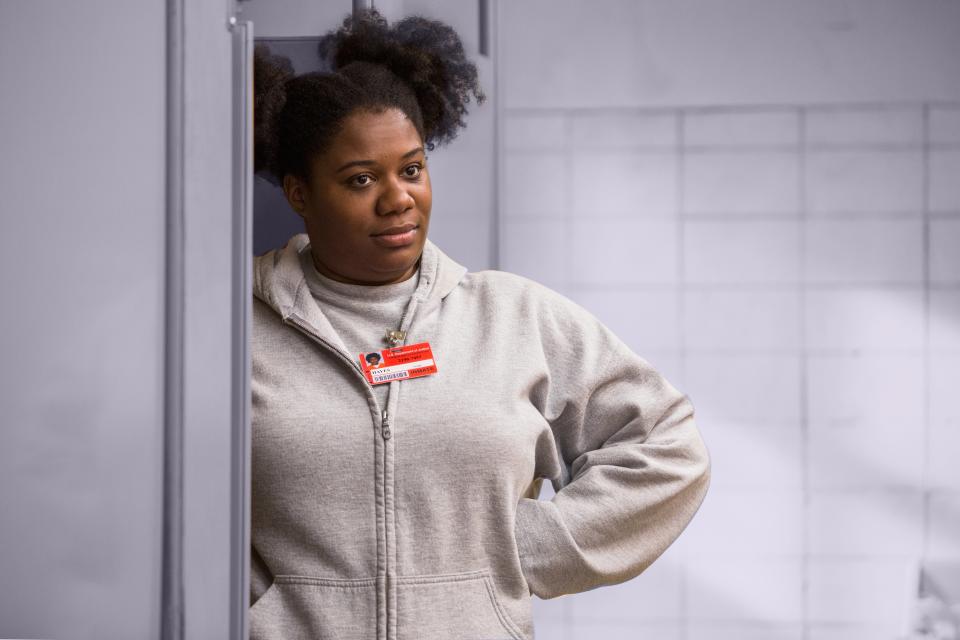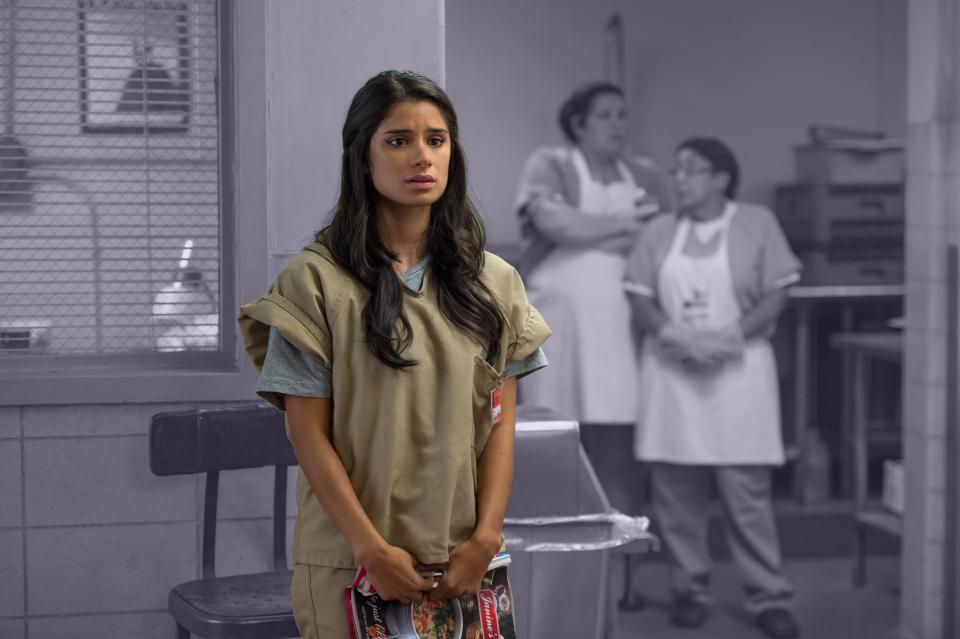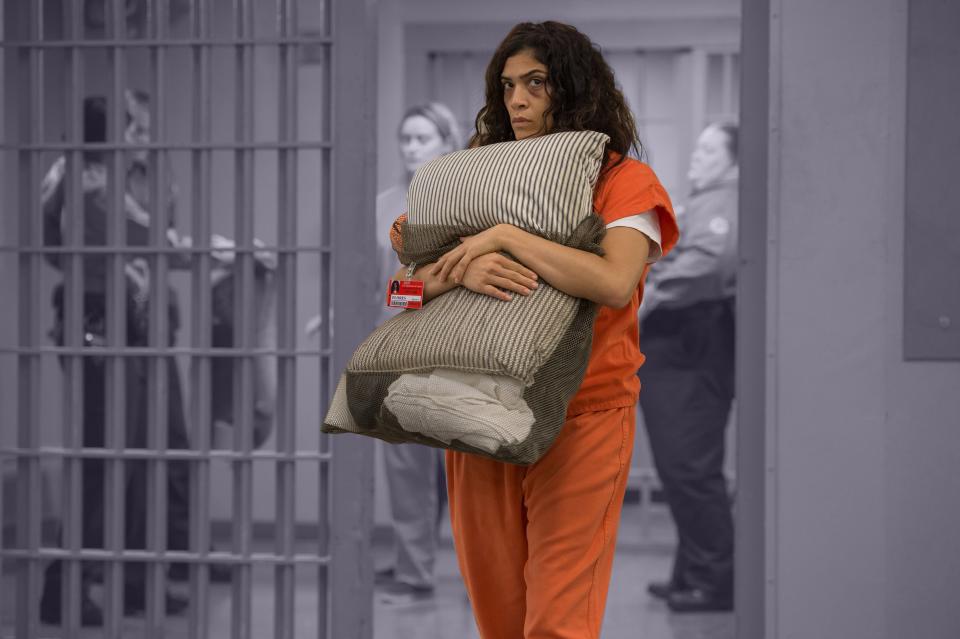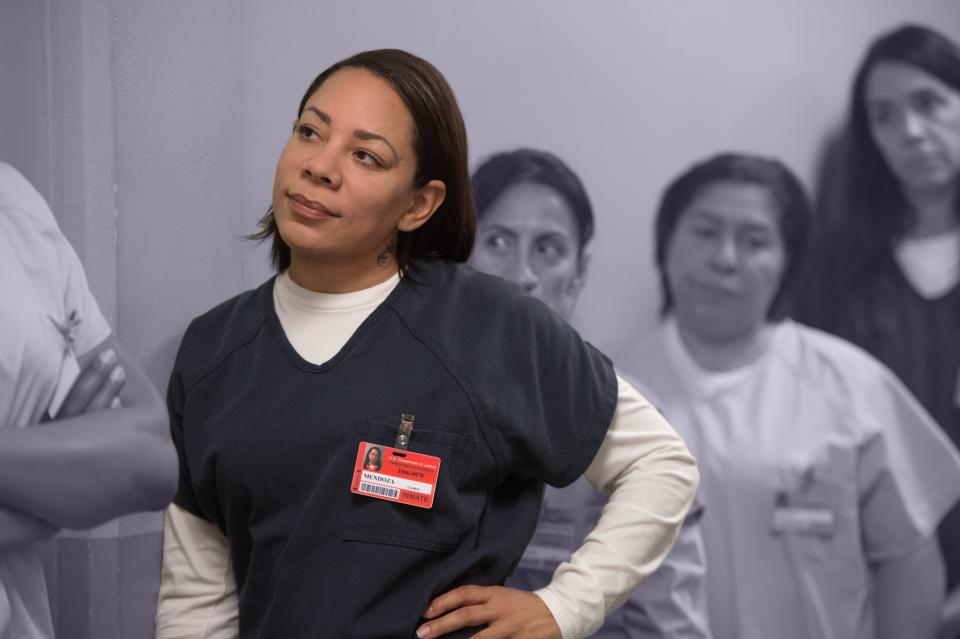‘We Broke a Lot of Rules’: 'Orange Is the New Black’s' Cast on Its Legacy

This article contains spoilers about the seventh—and final—season of Orange Is the New Black, now streaming on Netflix.
Adrienne C. Moore (she plays Cindy Hayes, the inmate who converts to Judaism in season three) is in Atlanta for her 20-year high school reunion when she calls. “I’ve been to past reunions since the advent of Orange Is the New Black, and one thing I love about my friends is they know Adrienne,” she tells Glamour. They may occasionally blurt out that she’s on a show, she concedes, but “they’re Atlanta folks, and Atlanta folks are very down-to-earth kind of people.”
Like so many members of the sprawling Orange ensemble, Moore was a relative unknown when she was cast on the series. She was booking theater roles, commercials, and guest spots in New York, sure, but breakout opportunities for women, let alone women of color, were rare. Nobody knew who she was.

“This industry is hard,” says Laura Gómez (Blanca Flores, who thought she was being released from Litchfield only to be sent to an immigration facility). “You’re put in a box.” She auditioned for Orange while she was writing and directing a short film at New York University; by that point, she remembers, “I was considering maybe going to Spain to turn things around. I don’t know that I was about to quit acting, but I was thinking of ways to quit the torture that I was experiencing here.”
Selenis Leyva (Gloria Mendoza, who at times was head cook and the leader of the prison’s Spanish Harlem) shares a similar story. “I started acting at the age of 18,” she says. “I did a lot of guest roles, theater—sometimes it was free and sometimes it was as if it was free. You name it.” She was two decades into her career and on the verge of dropping out when she was tapped to play Gloria. “Literally, I said, ‘I’m done with acting,’” she recalls. “And then Orange popped up.”
“What the show did for so many of us, if not all of us, was open or reopen big doors,” Gómez says. “It put us on the map.”
“I’m happy it wasn’t a happy ending. If it was, I’d be questioning what the hell we’re doing here.”
When Orange premiered in 2013, there was some skepticism about whether it would sugarcoat prison. After all, the series is based on a memoir by Piper Kerman—a white middle-class Smith College graduate—and stars Taylor Schilling as the fish-out-of-water inmate. But as creator Jenji Kohan explained from the outset, Piper was her “Trojan horse”: a stock blond that gave entrée into a more expansive world, one where women of all colors, shapes, sexual orientations, and ages coexisted. Orange wasn’t a Pollyanna prison story, and Kohan wasn’t making TV as usual.
“Before Orange, I don’t think I ever saw stories like this being told,” says Diane Guerrero (Maritza Ramos, the quick-witted best friend of Flaca). “I’d never seen a character that was transgender, I never saw LGBTQ life so vividly [portrayed]. I never saw any of that, let alone more than one woman of color in the same room.”
Although she was absent from season six, Guerrero returned to the show’s final installment as part of its haunting and timely immigration storyline. PolyCon, the profit-driven company that runs Litchfield, is now the proud owner of a detention center; Maritza, who was seized in an ICE raid, is being detained. (She finds out while incarcerated—and effectively cut off from legal counsel—that she wasn’t born in the United States.)

Just as Kohan and her writers visited a minimum-security prison in the early days of Orange, she and her current staff went on a fact-finding mission to a detention center in California in preparation for this final season. “It was so bleak we had to cancel work the next day because nobody would talk,” Kohan says. “It was super upsetting.”
Executive producer Tara Herrmann, who was on the call with Kohan, remembers feeling particularly disturbed by their conversations with the guards. “We would ask questions,” Herrmann begins, “and you could tell that there was…” Kohan finishes her thought: “Very little recognition that they were dealing with human beings.”
Their takeaways were apparent onscreen. “It was intense,” says Guerrero, whose own parents were deported to Colombia when she was 14. “But it was also so gratifying because these are the stories I want to tell.”
The last time her character appears on the show, she’s seen handcuffed on an airplane, leaving the only place she’s ever called home. “I’m happy it wasn’t a happy ending,” Guerrero says. “If it was, I’d be questioning what the hell we’re doing here.”
“The truth is, everything doesn’t have a happy ending.”
All told, the series has very few happy endings. Gloria’s release from prison certainly qualifies as one. Blanca’s reunion with her boyfriend Diablo does too, in a way. (“Yes and no,” Kohan says. “She’s in fucking Honduras.”) But had there been too many tidy conclusions, the show wouldn’t have felt realistic—nor would it have been sending a responsible message. “We tried to leave people hopeful with some stories,” Herrmann says. “But when we’re talking about prison, we definitely didn’t want it to seem like there isn’t still a lot that needs to be done.”
One of the more excruciating endings belongs to Taystee Jefferson, the character played by Danielle Brooks, who is left serving a life sentence for a murder she didn’t commit. Moore, whose character wrongly implicated Taystee in the death of guard Desi Piscatella last season, remembers asking Kohan if the real story about his death would come out. “She was like, ‘No. Because the unfortunate truth is that this is what happens.... There are inmates who are serving life sentences for crimes that they didn’t commit, and that’s the story we have to tell, as difficult as it is.’
“Hollywood sometimes has this desire to make a happy ending for everything,” Moore concludes. “But the truth is, everything doesn’t have a happy ending.”

Although rarely sanctimonious, Orange is at its core a politically progressive series that puts the prison industrial complex under a microscope, examining the perils of privatization, the inhumane treatment of mentally ill inmates, and the unchecked power of abusive guards. It’s also a show that challenges viewers’ predisposed beliefs—whether about criminals, Bible-thumping meth heads, butch lesbians, or perverted wardens. Everyone has layers in the world of Orange; there aren’t bad people so much as there are bad decisions, bad circumstances, bad luck. Take a closer look, and you might understand where almost anyone (with the exception of Piscatella types) is coming from.
“That’s what I love about Orange,” Leyva says. “We all made assumptions [about these characters], and then we started getting backstory and we went, ‘Oh, wow, okay.’ It changed how you saw a person, and it made you almost forgive them for their actions.”
For some fans and critics, the show’s push for empathy went too far in season four, with the death of Poussey Washington (played by Samira Wiley). The story drew on the Black Lives Matter movement (“I can’t breathe,” Poussey gasps as she’s pinned to the cafeteria floor). But because Baxter Bayley, Litchfield’s least experienced and least overtly corrupt corrections officer, is the one who accidentally kills her—rather than a more clear-cut villain like C.O. Humphrey—the audience was asked to consider his pain alongside hers. It was an uncomfortable burden, especially for the show’s black viewers, who’ve seen enough racist violence go unpunished in real life. The question arose whether Orange, a show written by mostly white people at the time, had become “trauma porn.”

“I think ‘trauma porn’ is a label we don’t accept,” Kohan says. “We are telling stories about characters, some of whom have trauma. I reject the phrase.”
As TV auteurs go, Kohan, who also created Weeds, is an especially provocative one. She’s blunt and opinionated, and not the type to take criticism into consideration when writing her show. “We do our thing,” she says. “Some people like it. If they don’t, okay. Don’t watch.” It’s an attitude that has rankled some—but also one that&aposs allowed her to make a trailblazing series. “We broke a lot of rules,” she says.
It’s not an overstatement to say that Orange transformed the way we watch TV. “We forget: Netflix wasn’t Netflix before Orange,” Dasha Polanco (who plays Dayanara “Daya” Diaz) says. The show was the platform’s second original series after House of Cards, and until it premiered, the now Goliath streaming service was best known for flimsy DVD mailers. According to Polanco, the cast wasn’t even allowed to use the word bingeing when doing press for the first season. “It was a negative term,” she says. “We ignited this whole new way of [consuming] media.”

Looking back, Polanco says she’s proud: “I’m like, it’s okay for you to own it and to say, ‘Hey, I’m part of that history, and I’m part of the domino effect.’ I have a little bit to do with that.”
Moore echoes her pride. “I’m honored to be a part of a show that dared to tell the truth about the American landscape,” she says. There are many ways to define Orange’s legacy—through its inclusive cast, its panoramic storytelling, its role in the streaming revolution. But Moore’s parting words seem to encompass it all. “I got into this business not only because I wanted to entertain people, but because I wanted to teach them something,” she says. “This show definitely taught a lot.”
Patti Greco is a writer and editor based in New York City.
Originally Appeared on Glamour

